Every SEM strategy, no matter how big or small, starts with keyword research.
Without the right target keywords, your SEM campaigns are likely to fail. Not only that. But you must keep a close eye on which keywords are generating conversions in order to maintain profitable campaigns.
There are the three elements you must include in order to nail your keyword research, which are:
- Identifying relevant, high-intent keywords
- Eliminating negative keywords from the mix
- Organizing your campaign into relevant ad groups
The best way to streamline this process? Use the right keyword tools.
There are dozens of tools that can help you choose the right target keywords. Not only will you be able to drive organic and paid traffic to your site, but you’ll be able to do it faster and easier than ever before.
In this article, we’ll provide a rundown of our favourite keyword tools on the web and how to use them effectively.
What Does a Good Keyword Tool Look Like?
Traditional and competitor-based keyword research are fundamental to your SEM strategy. If you want to get the most out of your keywords, you must understand both approaches.
For example, entering a ‘seed’ keyword into your chosen keyword tool, you’ll be given several (often hundreds) of keyword ideas based on what you entered. Campaign managers can organize and crunch this data to identify the best opportunities. This is what we call “traditional keyword research.”
Competitor-based keyword research allows you to measure how much effort you’ll need to rank. Use keyword research tools to assess phrases that your competitors are ranking for, and evaluate if you should challenge them. (Tip: this is not the same as the “competition” metric often displayed alongside keyword data).
Keyword research tools provide accurate insight into both of these factors. As a digital marketer, there is no harm in generating as much data as possible!
Uncovering New Keyword Ideas and Trends
The best keyword research software should provide you with as many relevant target keywords as possible. Identifying keyword trends will show you the average number of times your keyword was searched for (averaged over a monthly period). In other words, you’ll find how many times a particular keywords or phrase is Googled each month.
This will give you the data to back up whether you should target a particular keyword, or cast it aside for phrases with a higher search volume.
It Should Give You An Insight Into Your Competition
In simple terms, competition data shows you how many pages on the internet include a particular search term. It should also show you how many other websites are targeting a keyword for their PPC efforts.
This metric helps you assess how much competition exists for that keyword, as well as other factors such as backlinks, avg. CPC etc. These factors will determine how difficult it is for you to rank for these keywords.
Many tools measure this using a metric known as “keyword difficulty.” If a phrase is “very difficult,” you may wish to rethink your approach. However, if you have the budget, domain authority and content to give you an edge, go for it.
This allows marketers to make decisions on which keywords to invest in. For SEO, the ideal combination is a keyword or term with high search volume and low search competition.
The Best Keyword Tools on The Web
The right keyword tool can act as a secret weapon to drive fresh traffic to your site. The first consideration marketers usually have is pricing. Which is why we’ve included several free options to get you started.
If you’re ready to invest some marketing budget into a more powerful tool, then you’ll find plenty of those too. Depending on your needs and approach to SEM, you’ll find something that caters to your needs.
1. Google Keyword Planner
Google Keyword Planner (GKP) is the best place to start your keyword research.
It’s free for Google Ads users, but the downside is you only get search data from Google, not Bing, Yahoo etc. But with 92% of people using Google as their search engine of choice, it makes for a great starting point for first-time SEM marketers.
The keyword planner will give you new keyword ideas and data to back up how many clicks and impressions you could generate. These datasets are perfect for both SEO and PPC.
Simply type in a rough keyword idea like this:

And GKP will give you suggestions based on that seed keyword:
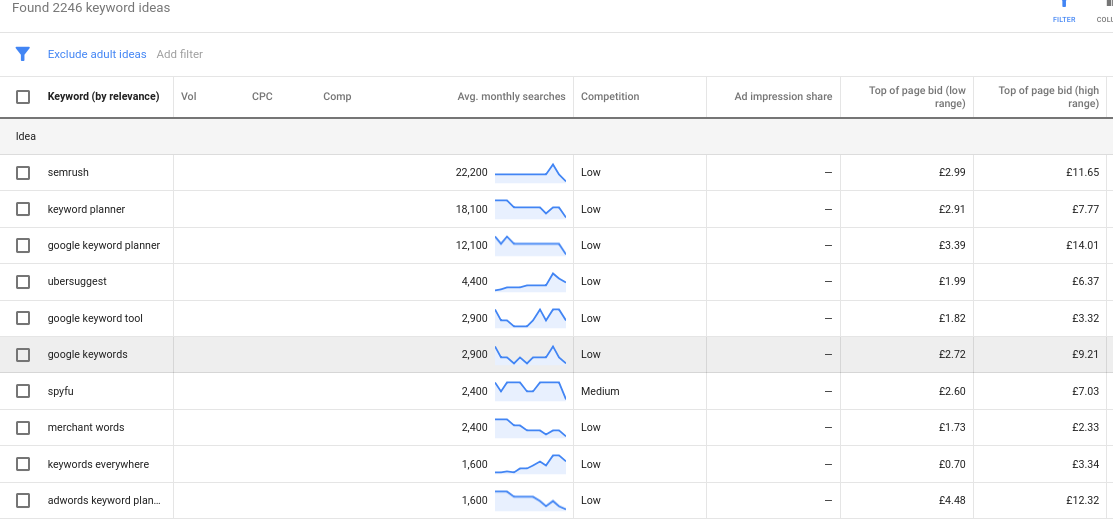
The best part about GKP is that Google shows you how many people search for them every month, as well as how much competition there is for each of them. Plus, you’ll see what other people are paying to rank for those terms.
All of this data makes it an ideal tool to plan your SEM (search engine marketing) budget.
- This tool is great for: Getting deep into Google’s brain and generating a bunch of keywords from a few initial ideas.
- The downside: If you want any information on any other search engine (Bing, Yahoo etc), sorry – you won’t get it here!
- Pricing: Free!
2. Google Correlate
Google Correlate often gets pushed to the side in favour of other tools. But it can be an extremely powerful and free tool for your keyword research:
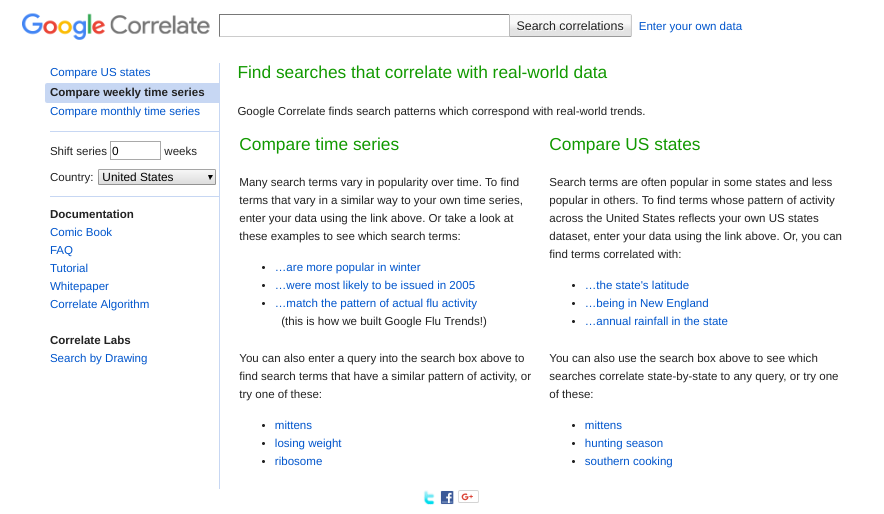
Google Correlate will show you which phrases are being searched for by the same users. This is great for uncovering long tail keywords. These long-tail keywords are phrases which contain three or more words, which are useful when targeting a niche audience with low competition.
Let’s say you wanted to search for the best keyword tools in Google Correlate. Simply punch your seed keyword in:
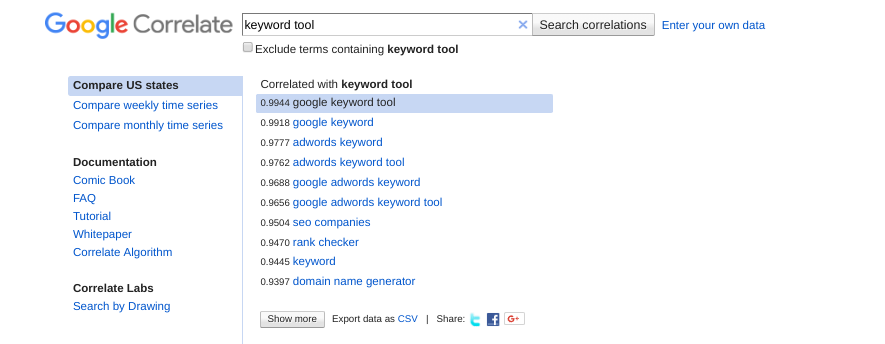
And you can see what relevant phrases searchers are tapping into Google. By running a few of these searches on subjects in your industry, you should be able to map out some ideas for content or keyword ideas.
- This tool is great for: Getting unstuck if you’re struggling to find new keyword ideas.
- The downside: Once again, you’ll be limited to Google data only.
- Pricing: Free!
3. Soovle
Soovle provides keyword suggestions from Google, Yahoo, Bing, Amazon, YouTube and even Wikipedia. You’ll get an eagle-eye view of what language all of your potential customers are using (not just the Googlers):

You can change the dominant source underneath the search box by clicking any of the logos on the results page.
- This tool is great for: Finding low-hanging fruit from major search engines in one place.
- The downside: It doesn’t give you data behind the keywords, including search volume and competitor data. You’ll need to select relevant keywords and punch them into another keyword tool.
- Pricing: Free!
4. Answer The Public
Who doesn’t want a gentleman in a nice jumper yelling at you when executing your keyword research?

Answer the Public provides insights on the language behind your target keywords. It scours the internet for your keyword and gives you suggestions through comparisons, alphabeticals and questions.
Enter your seed keyword and you’ll see a list of propositions, based around: for, can, is, near, without, with, and to.
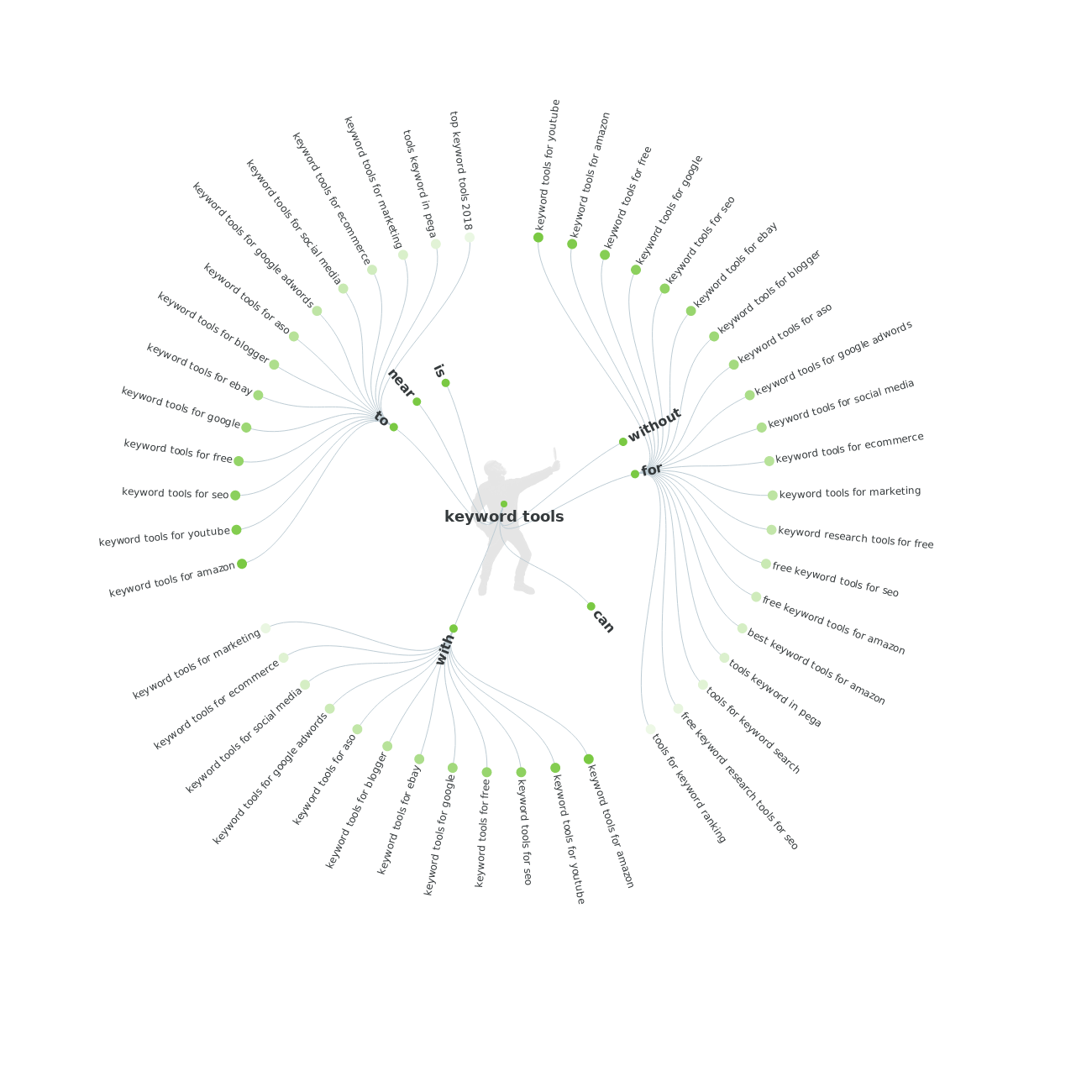
(Tip: If you find the images on the tool a bit hard to follow, you’ll also have access to a list to work from.)
You’ll also see a list of comparisons (like, or, versus etc.) as well as a list of alphabeticals, sourced from Google Autocomplete:
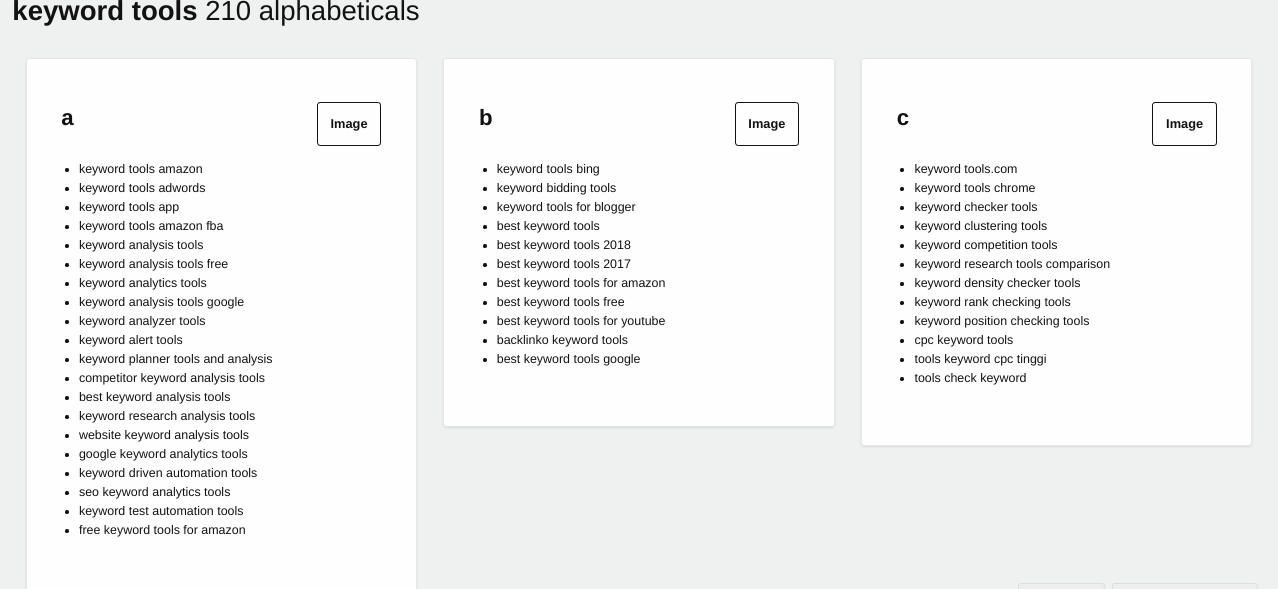
- This tool is great for: Coming up with keywords from different angles. It’ll also export all your findings to CSV without having to hand over your email address.
- The downside: It is assumed data is sourced from Google Keyword Planner, but it’s not 100% certain. It can also be a steep learning curve getting to know how the tool really works.
- Pricing: $99 /MO (free plan available).
5. Wordtracker Scout
Wordtracker is a Chrome extension you can use to yield keyword data from your competitor’s websites.
Using the tool, you can surf any website your target audience is interested in and uncover all the keywords that page targets with a single click.
This is handy when uncovering new topics your audience is interested in and the keywords you’re searching for. It will also share the language they’re consuming that content in.
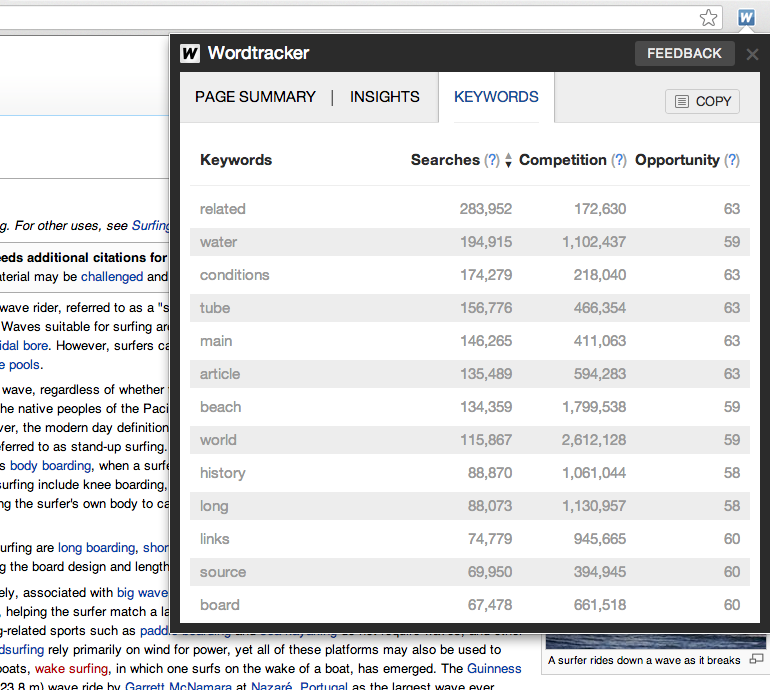
Once you’ve got a list from the tool, you can pick the highest performing keywords and add them to your marketing plan.
Best of all, you can steal them right from your competitions homepage.
- This tool is great for: Spying and using your competition to discover (and steal) their keyword ideas.
- The downside: Other keyword tools that give you more data might be better valued.
- Is it free? $27 /MO (free trial available).
6. Ubersuggest
Ubersuggest, which used to be a premium product, was recently acquired by Neil Patel, who took down the paywall and offers it to his readers for free.
The tool sources data from Google Suggest:

Every time someone makes a search, it’s stored within Google. That makes the data that powers Ubersuggest “uber reliable.”
Simply enter a keyword into Ubersuggest’s sleek UI and you’ll see a variety of data behind your phrase of choice:
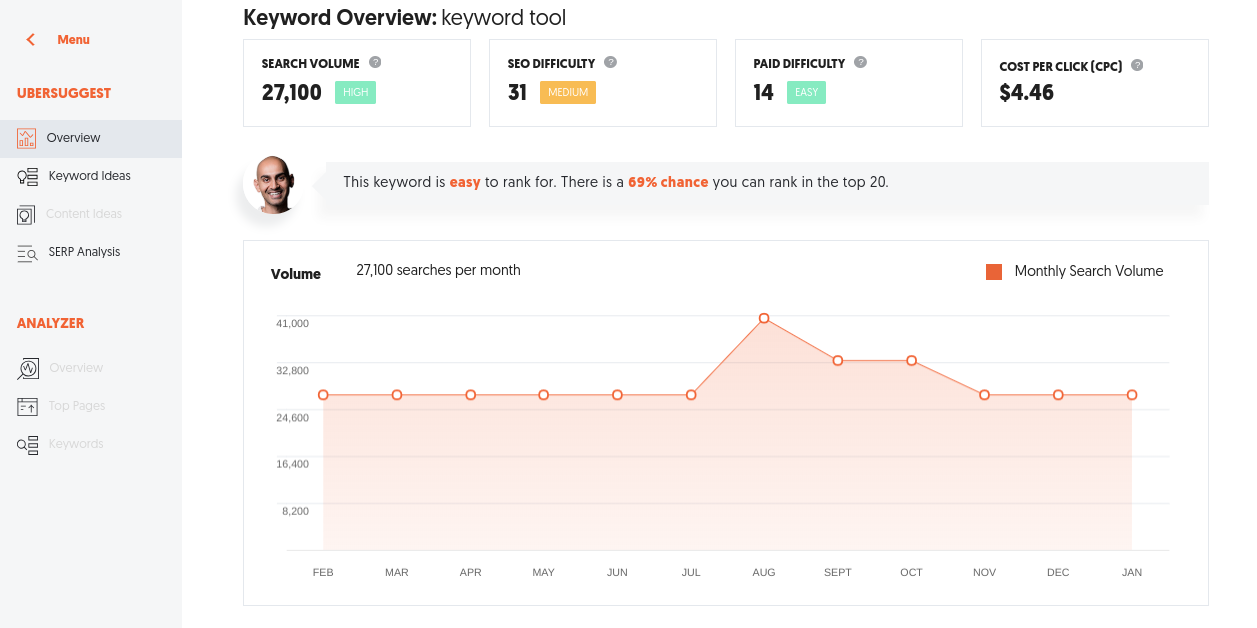
With a simple yet powerful breakdown in its “Keyword Ideas” tab:
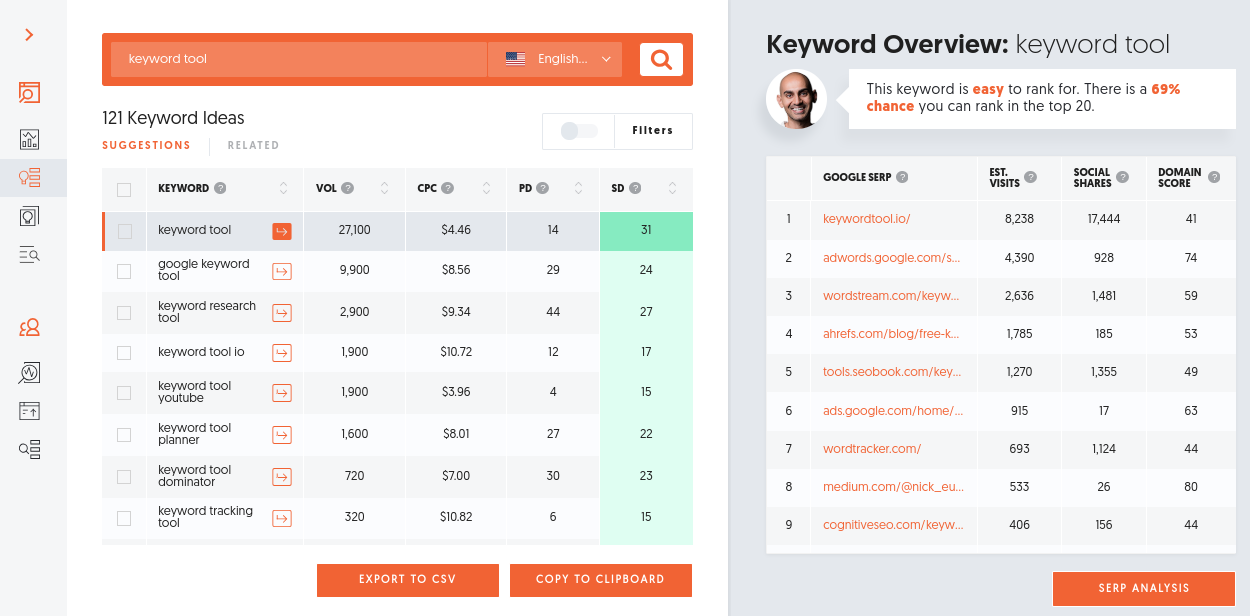
A feature that makes this tool different is its search options. You can also search for news, YouTube, shopping and image results.
- This tool is great for: Finding keywords using different sources.
- The downside: It can be a little limiting for power users. For all its ease of use, it lacks in its ability to do advanced searches.
- Pricing: Free!
7. KWFinder
KWFinder has one mission and one mission only: finding the best target keywords. Specifically, long tail keywords.

By entering your seed keyword, the tool will break it down and uncover long tail keywords based on your information. It also provides you with keywords that aim to solve the searchers’ problem. These are the keywords that Google loves.
You’ll also get a breakdown of traffic and keyword difficulty:
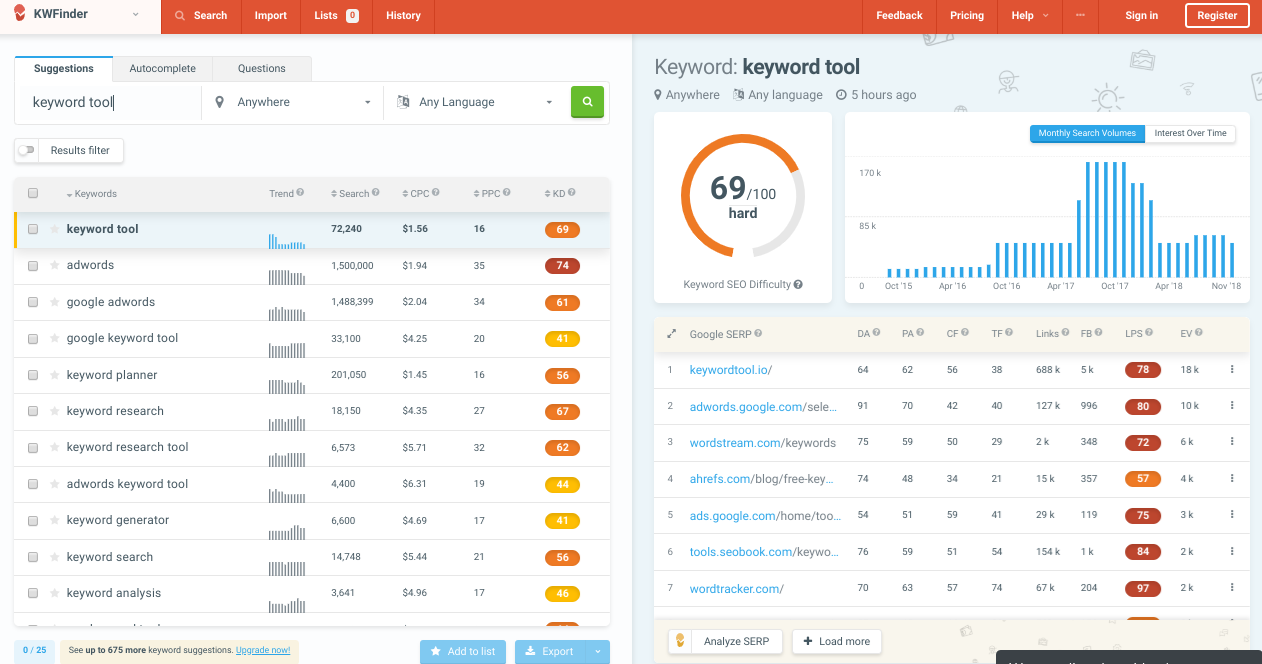
At the bottom of the page, you’ll also find an option to look at the SERP analysis of the keyword. For a free tool, this is where KWFinder breaks away from the rest:
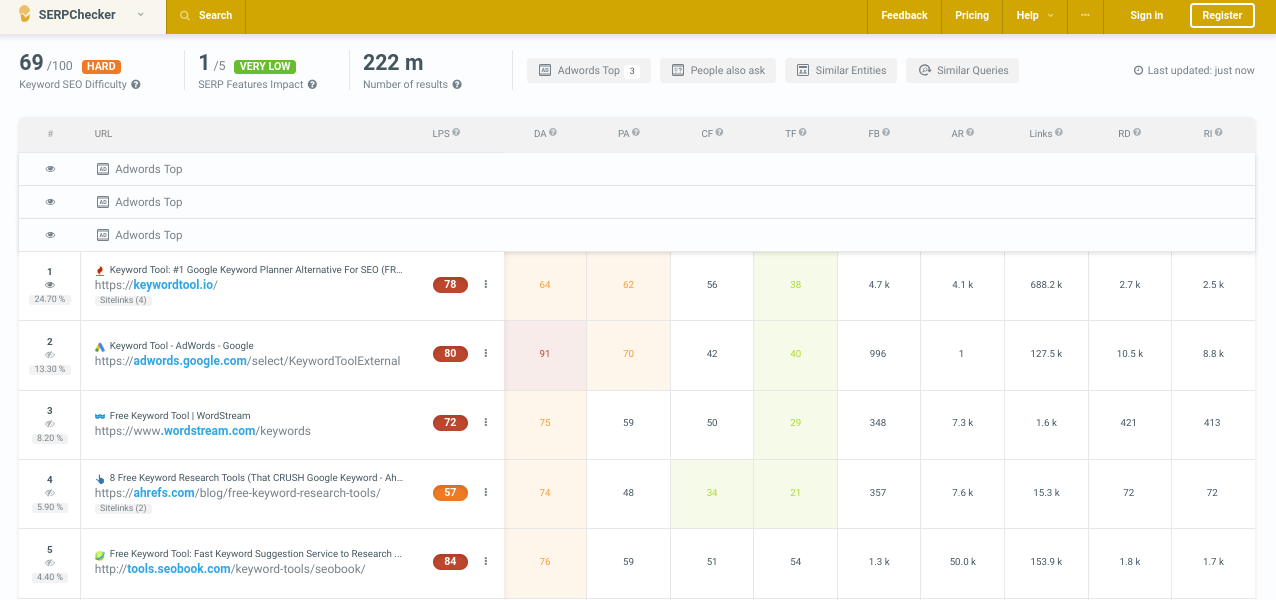
- This tool is great for: Scoping out those unicorn keywords: long-tail keywords.
- The downside: Limited functionality on the free version.
- Pricing: Plans start at $25.50 (free for the first 25 keywords).
8. SEMRush Keyword Magic Tool
SEMrush provides a range of data on your competition, as well as a comprehensive breakdown of the SERPs. This will help you create better content and take some of the market share of organic and paid traffic from your competitors.
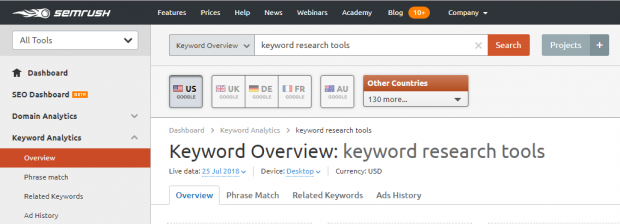
SEMRush also provides you with backlink data. Without backlinks, you’ll be fighting an uphill battle when looking to rank organically in the SERPs.
It’s also useful when generating several of keyword ideas, which can then be filtered and saved within the tool.
- This tool is great for: Building a strong backlink strategy for your SEO efforts.
- The downside: Pro plans can be steep for beginners.
- Pricing: Free for up to 10 queries a day (which can be enough if you’re just starting out). Premium plans start at $99.95 /MO.
9. Ahrefs
Many marketers consider Ahrefs to be the crème de la crème of SEO tools.
It’s great for basic keyword research. But where Ahrefs excels is in comprehensive backlink, keyword and site analysis. All of this data is exactly what you need to get your website ranking organically.
Ahrefs has all the features you need to conduct traditional keyword research, and it has the largest backlink index on the web—15 trillion backlinks, to be exact.
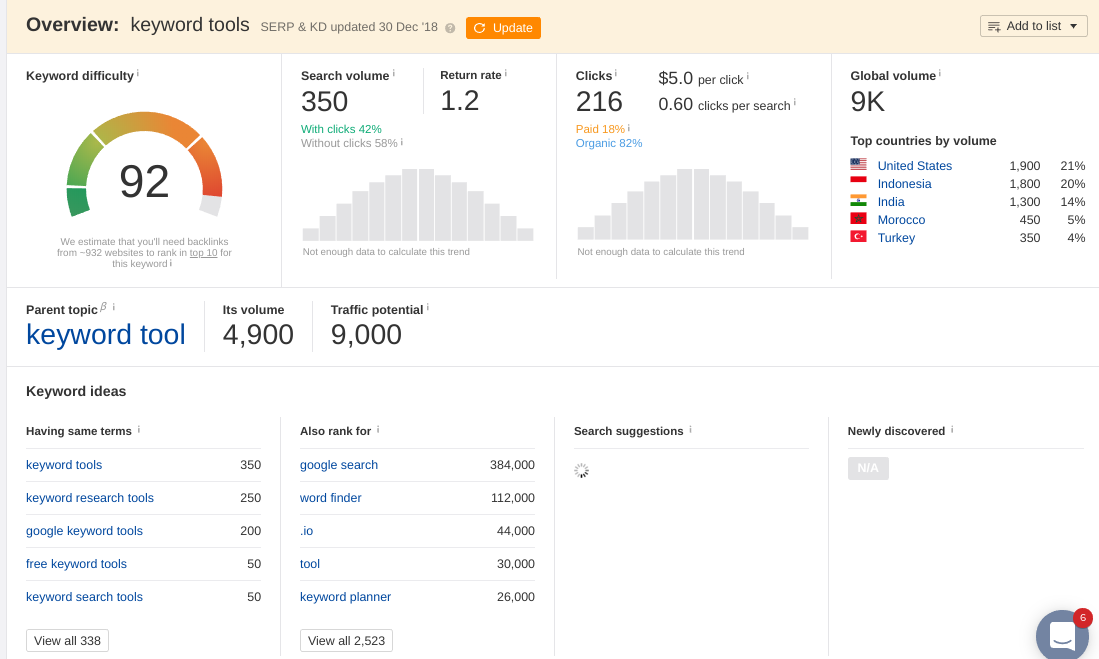
Although it’s one of the most advanced tools on our list, the UI keeps everything simple enough for the average user. Keyword difficulty, search volume and estimated CPC are all easy to analyze.
- This tool is great for: Understanding advanced keyword research. They also have an avid community of loyal followers who are active on the forums.
- The downside: Similar to SEMrush, pricing can put beginner players off.
- Pricing: Plans start at $99 /MO.
10. Keywords Everywhere
Keywords Everywhere is an extensions you can add straight onto Chrome or Firefox.
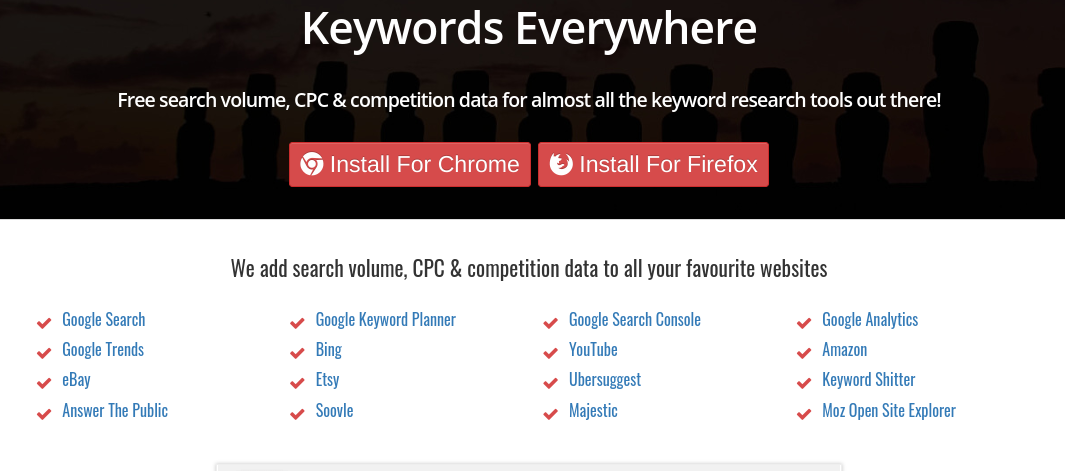
While the functionality is similar to Wordtracker Scout, it gives you comprehensive data directly from the website you’re browsing. Search volume, CPC and competition data is all available from a single click.
Keywords Everywhere also pulls data from several sources. These include Google, Amazon, Bing, Google Analytics, Ubersuggest, YouTube and eBay, just to name a few.
It’s a handy way to search from your browser without having to switch between a keyword tool. And you can download all your data into a CSV or PDF file right from the extension, too.
There’s also a feature that lets you see “what other people are searching for”. Super handy for finding those keyword unicorns.
- This tool is great for: Saving time while researching keywords. You can plug keywords in and build a list (backed up by data) without leaving a webpage.
- The bad stuff: You have to install the extension in your browser, generate an API key and hand over your email address.
- Pricing: Free!
11. Keyword Tool
Keyword Tool is another platform that’s powered by Google Autocomplete.
It will suggest keywords that users are typing into Google Search. Just enter your seed keyword and the tool will suggest long-tail keywords for your SEM strategy:
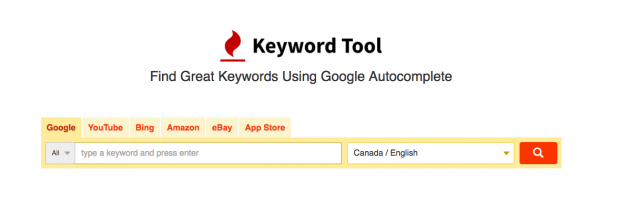
Keyword Tool also pulls data from Amazon, eBay, YouTube and more, which is great if you’re in the ecommerce or retail space.
It also provides multilingual functionality. Keyword Tool allows you to perform keyword research in 83 different languages. This functionality is ideal for marketers who have audiences across several geos.
- This tool is great for: Finding long tail keywords (even in other languages).
- The bad stuff: Although the free version gives you 750 ideas from each term, it’s otherwise limited. You only get suggestions, so no data analysis.
- Pricing: Starts at $88 /MO (free version available).
12. Moz
Moz has grown to become a well-loved tool for marketers and SEO experts alike.
The free version of its keyword research tool provides you with plenty of features to get started. On top of that, you’ll get a detailed breakdown of search volume, keyword difficulty and other metrics.

One of the best things about Moz is its ease of use. Although it gives you some complex data (organic click-through-rates, SERP analysis and domain authority), it’s all easy to digest. Even if you aren’t a seasoned SEO pro.
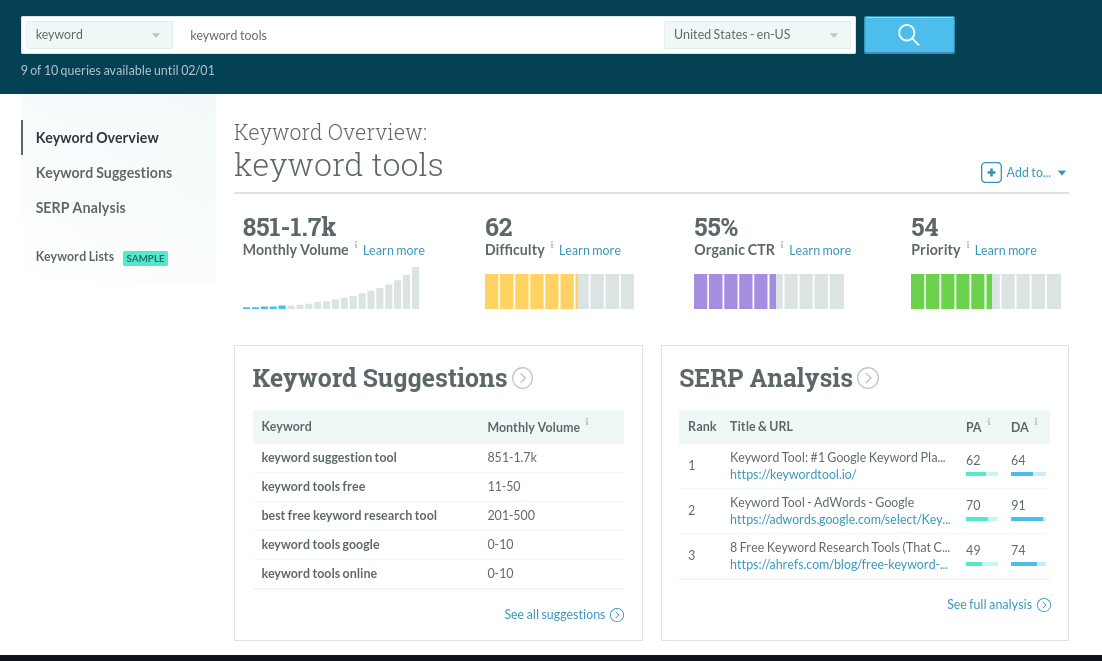
If you don’t want to pay right away, you only get two search queries per day. If you don’t want to sign up for their paid plan straight away, you can get a 30 day free trial to see if it’s the right fit for you.
- This tool is great for: It’s a one-stop shop – it gives you keyword ideas, volume, and relevancy.
- The bad stuff: The free plan only lasts for two searches.
- Pricing: Plans start at $79 /MO (free version available).
Conclusion
For your SEM strategy to succeed, you need a keyword research tool that provides the right data to inform your plan.
Utilizing keyword suggestions is one thing. But digging into data like volume, competition and SERP analysis will drive you towards success.
Whether a tool is free or not shouldn’t be the main reason behind your tool of choice. Instead, decide what tool to use by keeping your end goal in mind: getting people to your website. Free, paid or both — use your keyword tools wisely.
Images:
Featured image: via Unsplash / Camille Orgel
Images 1, 2, 3, 4, 5, 6, 7, 8, 9, 11, 12, 13, 14, 15, 16, 17, 18, 19, 20, 21, 22: Screenshots by the author
Image 10: Wordtracker



